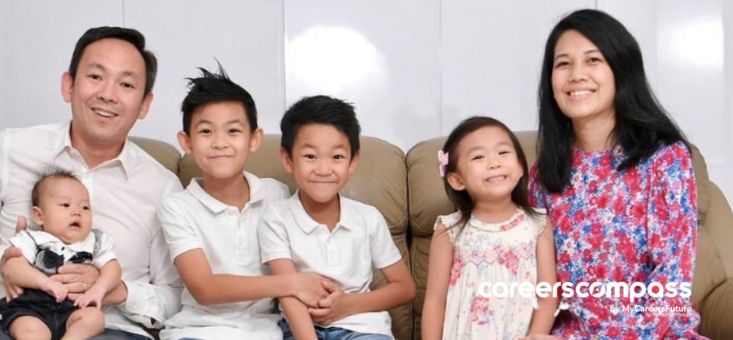In the past, fathers would go home and slouch on the sofa after work, glazed-eyed after a long work day, while stay-home mothers would fuss over the children’s meals and schoolwork.
But in today’s dual-earner families, with both parents working, Singaporean dads are now stepping up, being more hands on and helping with domestic duties.
In addition, hybrid and work-from-home arrangements during the Covid-19 pandemic has also given them more time to spend with their kids.
However, the struggle to juggle parental duties and career remains, and it’s not always easy to make the right priorities in the moment.
For Bryan Tan, the chief executive officer of Dads for Life and the Centre for Fathering, sometimes the best way forward is to “prioritise things in your life so you don’t neglect family and relationships”.
Launched in 2009, the Dads for Life movement is an initiative of Centre for Fathering, a non-profit organisation established in 2001, that empowers more fathers to be better role models to their children.
Bryan is married to Adriana, an entrepreneur, and has three children: Michael, age 12; Joshua, age 8; Deborah, age 6, and Samuel, who is 1. He was previously a senior officer with the Singapore Armed Forces (SAF) and made a mid-career switch to the social service sector.
Making hard choices
His journey juggling career and parenting will strike a chord with some local dads, with his priorities previously being to “provide materially for my family as best I could, and mask my inadequacies by being present physically, but not emotionally, to my children”, as he revealed to Today.
He said: “During the earlier years of my career, while I served in the SAF, I chose to work very long hours and was not there for my family when they needed me.
“Back then, I was unaware of what my children required at their significant lifecycle stages (e.g. early childhood, teenage and young adult phases). I failed to realise how important my presence and involvement in their daily lives were.
“I always thought I had time over the weekend or holidays to make up for my absence, but that wasn’t true for my children. I also did not understand what my wife required and expected of me, as a partner in marriage and in raising our children, at those stages too.”
Bryan now knows he took for granted that Adriana would always take time off her career, to tend to the children’s needs, instead of him chipping in, and learnt that the disparity made her feel that she was less important than his own career.
The turning point
“I could be a hero at work, but in the past, I would return home drained by the time I got through the front door. And so, my wife had to put up with a side of me nobody else got to see.”
When moments like these became clear to Bryan that he wasn’t doing as great a job as a father or husband, some hard decisions needed to be made.
In his journey with the Centre for Fathering, his experiences with its wide network of active fathers and fathering coaches inspired him to join up as a staff member in August 2016. But this also meant moving from a stable career in the SAF to a charity organization that relies on public donations.
On top of that, in the same week he tendered his resignation, Adriana was retrenched, and they discovered they were expecting a third child!
As the saying goes- when it rains, it pours, but Bryan believes that pulling through such daunting times has strengthened the family as a whole.
“While learning to negotiate new challenges and storms, we learnt to ride the turbulent waves together.
“In the process, I even opened up to my children to share my concerns and vulnerabilities with them. I want them to grow up with an accurate picture of who their father really is, and what I’ve had to face.”
Taking his own lessons to use in the workplace
Now the chief executive at Dads for Life and the Centre for Fathering, Bryan believes it is important to ensure their own organisation is as parent-friendly as possible.
“The Covid-19 pandemic has allowed me to appreciate the value of flexible work arrangements in helping my colleagues thrive at work and at home.
“A third of our staff at the Centre for Fathering are employed on a part-time basis, so they can fulfil both work and home responsibilities in productive and meaningful manners.
“Many of them hold management positions too. Since the pandemic started, everyone has been placed on flexible work arrangements.
“We have found that these arrangements can continue indefinitely, because staff have so successfully integrated work and life at home as to achieve peak performances at both.
They have also restructured to become more “porous”, so people can leave and re-join again at different life stages, thereby bringing new skillsets and experiences that can further enhance the organisation’s capability and capacity.
Coming full circle
After his career switch, Bryan admits that while his work hours may be more irregular, given the events he is required to attend tend to be in the evening or over the weekend, the organisation’s flexible work arrangements do help.
“I am able to make up for the time I am away by sending my children to school, picking them up after, and having lunch with my wife on weekdays.”
It helps he is also able to bring them to work if no one is available to take care of them at home.
It’s also a source of family amusement that they’ve begun to mimic the way he speaks and behaves at meetings, and even towards his colleagues!
“This has made me very aware of the importance of role-modelling to my children the types of values and attitudes I bring to work, life, and the people around me.
“I might not always be right, but I have to show them how to navigate disappointment, fear and frustration, and how to pick ourselves up from failure,” Bryan concluded.
And ultimately, isn’t this really what parenting is all about?















